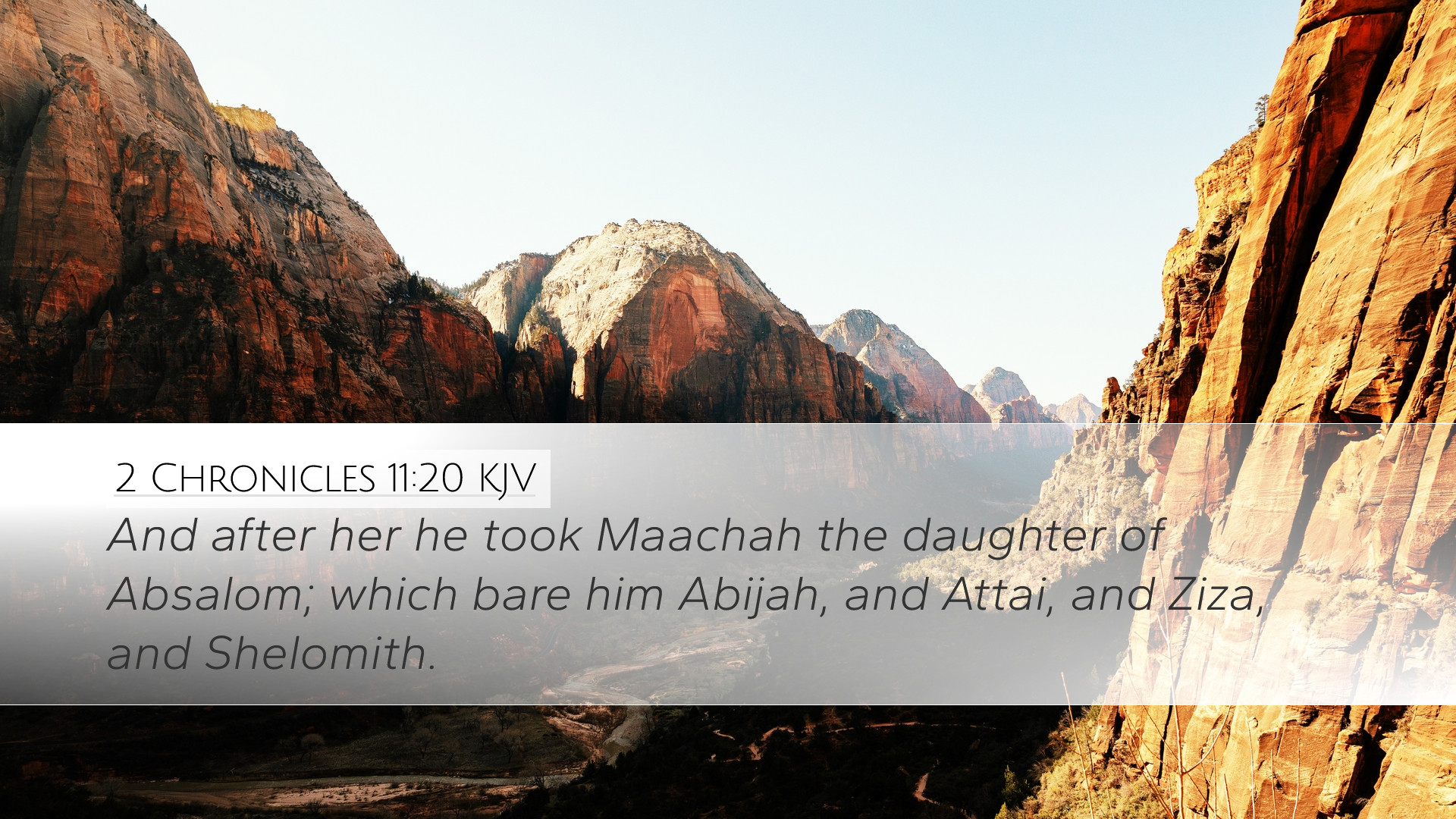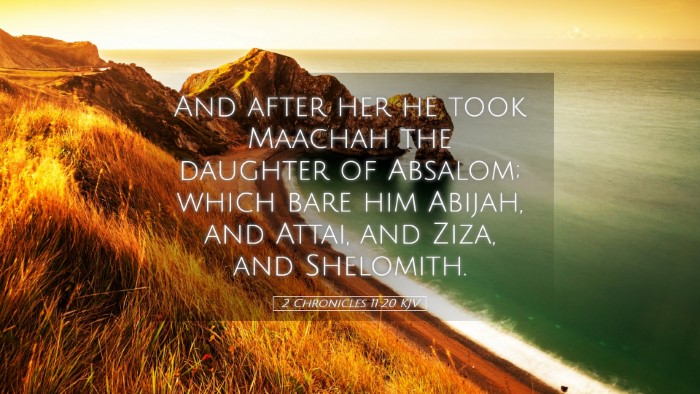Commentary on 2 Chronicles 11:20
Bible Verse: 2 Chronicles 11:20 - "And after her he took Maachah the daughter of Absalom; which bare him Abijah the chief of his sons."
Introduction
The verse taken from 2 Chronicles 11:20 presents an important moment in the narrative of King Rehoboam's reign over Judah. In the historical context, this verse underscores the political and familial dynamics at play during the early years of Rehoboam's kingship following the division of the kingdom.
In examining this text, we can draw from the insights of several notable public domain commentaries, including those by Matthew Henry, Albert Barnes, and Adam Clarke, to enrich our understanding of its implications for covenant theology and the lineage of Davidic kings.
Context of 2 Chronicles 11
The background of 2 Chronicles 11 revolves around the schism that occurred after Solomon's reign. Rehoboam is confronted with the challenge of maintaining unity within a fractured kingdom. The selection of his wives, particularly Maachah, highlights not only personal choices but also the political considerations involved in marriage alliances that were commonplace in the ancient Near Eastern context.
Insights from Matthew Henry
Matthew Henry emphasizes the significance of Rehoboam’s marriages as part of God's sovereign plan. He notes that the mentioning of Maachah, the daughter of Absalom, carries with it weighty implications regarding dynastic legitimacy and the continuation of the Davidic line.
- Rehoboam’s Choices: Henry interprets Rehoboam's selection of Maachah—which mirrors an affinity for both beauty and political alliances—as reflective of his priorities, suggesting that this choice could have ramifications for the spiritual health of the nation.
- The Role of Maachah: Furthermore, he points out that Maachah later becomes the mother of Abijah, indicating that Rehoboam's decisions bear tangible consequences for future leaders and the fate of the kingdom.
- Divine Providence: Henry reminds the reader of God's providence in guiding the lineage that leads to eventual messianic fulfillment, emphasizing the importance of fidelity to God's covenant.
Insights from Albert Barnes
Albert Barnes offers a thorough exposition that provides socio-political context to Rehoboam's choice of wives. He argues that the mention of Maachah in this context speaks to the alliances Rehoboam sought to maintain stability in his kingdom.
- Political Alliances: Barnes notes that marrying Maachah—who is identified as the daughter of Absalom—may indicate an attempt to strengthen ties with influential families, reflecting the political strategy necessary for a ruler in a tumultuous landscape.
- Abijah’s Legacy: He further highlights that Abijah, as the chief son, would inherit the complexities of his father's reign, suggesting that Rehoboam's choices had long-lasting implications for Judah.
- User of Divine Favor: Barnes also discusses the idea of divine favor in kingship, suggesting that Rehoboam's marriage decisions should ideally reflect righteousness and commitment to God’s will.
Insights from Adam Clarke
Adam Clarke provides a critical look at the implications of Rehoboam's marriage choices in terms of moral and theological considerations. He emphasizes that the lineage stemming from these alliances could result in either blessings or curses, depending on the spiritual integrity of his successors.
- Moral Implications: Clarke poses the idea that while Maachah was the daughter of Absalom, her heritage might bring some moral baggage from the legacy of rebellion against David, cautioning the reader about the importance of spiritual fidelity in leadership.
- Impact on God’s Covenant: He stresses that the choice of partners in covenant relationships can significantly impact God’s covenant people, suggesting that inadequacy in this area might lead to spiritual decay.
- Reflection on Abijah: Clarke's observations about Abijah’s role as the chief son reflect a nuanced interpretation of how familial decisions have broader implications for the monarchy's continuity and the people's faithfulness to Yahweh.
Theological Reflections
The insights derived from these commentaries shed light on the critical intersection of politics, family relationships, and divine providence in the unfolding story of God’s chosen people. Key theological reflections include:
- The Sovereignty of God: This verse illustrates how God’s sovereignty operates through human decisions, where even unwise choices are ultimately utilized by God for His purposes.
- Legacy and Continuity: The importance of lineage in the ancient Near Eastern context underscores the Christian understanding of covenant continuity leading to the ultimate fulfillment in Christ.
- The Role of Leadership: The leadership shown by Rehoboam in personal and national choices reflects the influence of character and fidelity to God on a leader’s legacy.
Conclusion
2 Chronicles 11:20 serves as a potent reminder for contemporary leaders to consider the spiritual implications of their decisions, particularly regarding personal alliances and commitments. This verse, while historical in context, also provokes modern reflections on the nature of leadership within the church and society. As pastors, students, and theologians delve into this scripture, the emphasis on divine providence, moral integrity, and lasting legacy remains ever significant in our pursuit of faithfulness to God's calling.


